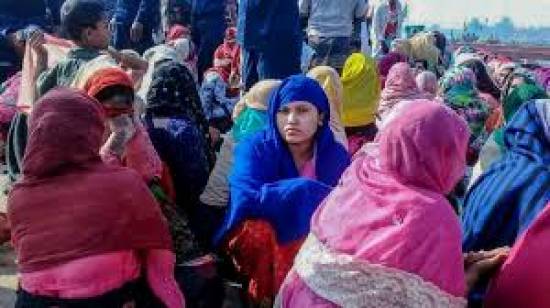Bangladesh urged to halt Rohingya relocation to island
A Europe-based Rohingya rights group on Saturday expressed concern over Bangladesh’s plan to relocate more than 100,000 Rohingya refugees to a remote island.
“We urge the international community, including the newly elected United States administration, South Asian nations, civil society groups and international organizations to help and persuade the Bangladeshi government to halt this procedure immediately,” the European Rohingya Council said in a statement.
Citing weak makeshift settlements for more than 1 million stateless Rohingya in Bangladesh’s southern district of Cox’s Bazar, the country’s authorities have started shifting 100,000 Rohingya refugees to Bhashan Char, a distant island reportedly prone to cyclone and other natural disasters.
Despite huge outcries by the international community and rights defenders, Bangladesh on Friday transferred the first batch of 1,642 Rohingya to the island that emerged only 20 years ago in the Bay of Bengal and has never been inhabited.
Another 3,500 will be sent to the island this week and the relocation is expected to be completed within a week, the Bangladesh Sangbad Sangstha news agency reported, citing naval sources.
The European Rohingya Council, however, said: “Every year, Bhashan Char remains submerged under rain water for several months and vulnerable Rohingyas will be further marginalized if they are forced to move here”.
Citing storms as “usual occurrence” at the island area, it added: “We vehemently oppose this relocation plan […] and if the Rohingya refugees are moved here, then they will face natural catastrophe of unimaginable magnitude”.
Call for peaceful repatriation
The rights body also advised Bangladesh to pay more attention to a peaceful and sustainable repatriation of Rohingya to their original land of birth in Myanmar’s Rakhine State.
“Bangladesh attempted to start repatriation of [Rohingya] refugees to Myanmar under a bilateral framework last November, but no refugee was willing to go back due to lack of safe conditions and continued genocide of Rohingyas in Myanmar,” it noted.
According to Amnesty International, more than 750,000 Rohingya refugees, mostly women and children, fled Myanmar and crossed into Bangladesh after Myanmar forces launched a crackdown on the minority Muslim community in August 2017, pushing the number of persecuted people in Bangladesh above 1.2 million.
Meanwhile, dozens of other global rights defenders and platforms including the United Nations, Human Rights Watch, Amnesty International and Fortify Rights have also urged Bangladesh to halt the relocation plan until a comprehensive feasibility study is done over the habitability of the island.
However, Bangladesh’s Foreign Ministry in a press release on Friday claimed that the island of 13,000 acres “has all modern amenities, year-round fresh water, beautiful lake and proper infrastructure and enhanced facilities”.
These include uninterrupted supply of electricity and water, agricultural plots, cyclone shelters, two hospitals, four community clinics, mosques, warehouses, telecommunication services, police station, recreation and learning centers, playgrounds and protective dam rounding the project area, the ministry added.
Speaking to Anadolu Agency, Louise Donovan, communications officer of the United Nations High Commissioner for Refugees (UNHCR), said: “We have heard reports from the camps that some refugees may feel pressured into relocating to Bhashan Char or may have changed their initial views about relocation and no longer wish to move. If so, they should be allowed to remain in the camps”.
She said that they have watched “troubling images” of some distressed refugees during the relocation process.
“We again emphasize that all movements to Bhasan Char must be voluntary and based upon consultations and full information regarding the conditions of life on the island and the rights and services that refugees will be able to access,” Donovan added./aa


